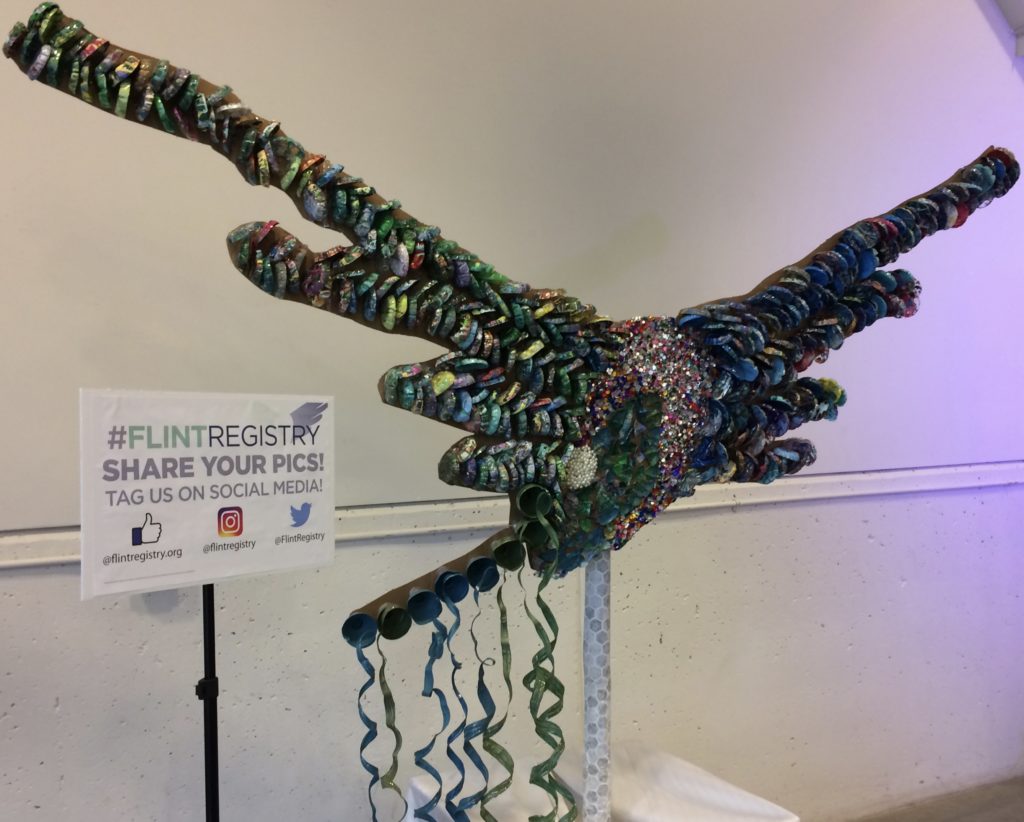
Displayed at the Friday celebration was a sculpture of The Flint Registry logo, a “sankofa bird,” made of water bottles painted by children at the Cummings Community School Great Expectations Early Childhood Program. According to West African mythology, the sankofa bird flies forward while looking backwards, with an egg in its mouth. (Photo by Jan Worth-Nelson)
By Jan Worth-Nelson
The Flint Registry, a four-year, federally-funded program designed to locate people exposed to the Flint water crisis, document and monitor their experience, and connect them with services and programs to promote health and wellness, launched formally Friday at the Flint Farmers’ Market amidst a dozen celebratory speeches, music, art, free teeshirts and cookies.
Speakers included Dr. Mona Hanna-Attisha, who emceed the event, along with Mayor Karen Weaver, U.S. Senators Debbie Stabenow and Gary Peters, U.S. Congressman Dan Kildee, U.S. Congressman John Moolenaar of Midland, along with local residents and teens from the Flint Youth Justice League.
“We are moving from crisis to recovery,” Weaver said, “and this is part of what has been taking us to recovery.” She added as of this week the city had excavated 20,131 pipes in the ongoing work to “get the lead out of Flint.”
 The Registry, she said, “is something we fought for, and we fought hard,” she continued. “What we need are fighters to keep fighting. This will help us decide what else we need to bring to Flint for services for our residents.”
The Registry, she said, “is something we fought for, and we fought hard,” she continued. “What we need are fighters to keep fighting. This will help us decide what else we need to bring to Flint for services for our residents.”
The main point repeated by many of the speakers was that “this will only work if people sign up,” as U.S. Senator Gary Peters said. “That’s the surest way you’ll be able to get the help you need.”
Registry staff, headed by director Dr. Nicole Jones, are seeking anyone exposed to the Flint Water Crisis from April 25, 2014 when Flint’s water switched to the Flint River, to October 2015 when the city reconnected to Lake Huron water–the high risk period prior to the emergency declaration announcement.
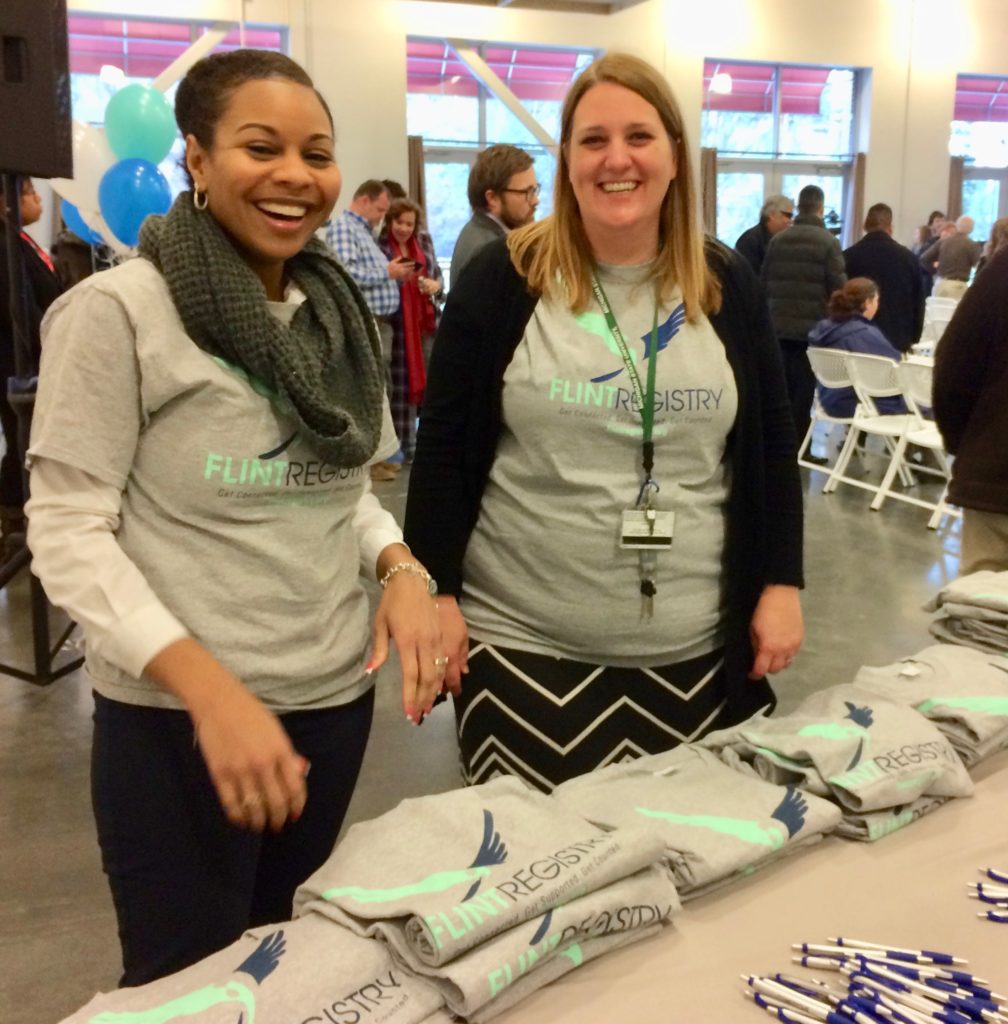
Flint Registry “swag” was given out to more than 200 guests by Janee Rankin and Tiffany Ceja (Photo by Jan Worth-Nelson)
That target population includes individuals who went to school in Flint, went to daycare in Flint, or worked in Flint–including prenatal exposure. Registry staff estimate that number to be about 150,000. Enrollees are requested to fill out a survey which takes about 45 minutes. More information on how to enroll is available at FlintRegistry.org, 833-GOFLINT, OR flintcares.com.
Although Friday marked the launch of the formal enrollment period for the registry, about 6,000 people already have signed up in a “pre-enrollment” phase, through the website FlintRegistry.org. Hanna-Attisha said the Registry staff have conducted 150 outreach events to inform the public, and have trained 235 “Flint Registry ambassadors” who will help continue the education and enrollment campaign.
As described in an East Village Magazine article in July, funding for the program originated with $14.4 million earmarked for Flint from the $150 million Water Infrastructure Improvements for the Nation (WIIN) Act signed by President Obama in December 2016. Dollars come in annual awards ($3.2 million last year) through the Centers for Disease Control (CDC) and related Agency for Toxic Substances and Disease Registries.
The Dean of the MSU College of Human Medicine, Norman Beauchamp, echoed the importance of the Flint Registry project, paraphrasing Thomas Carlyle that “He who has health has hope, and he who has hope has everything.”
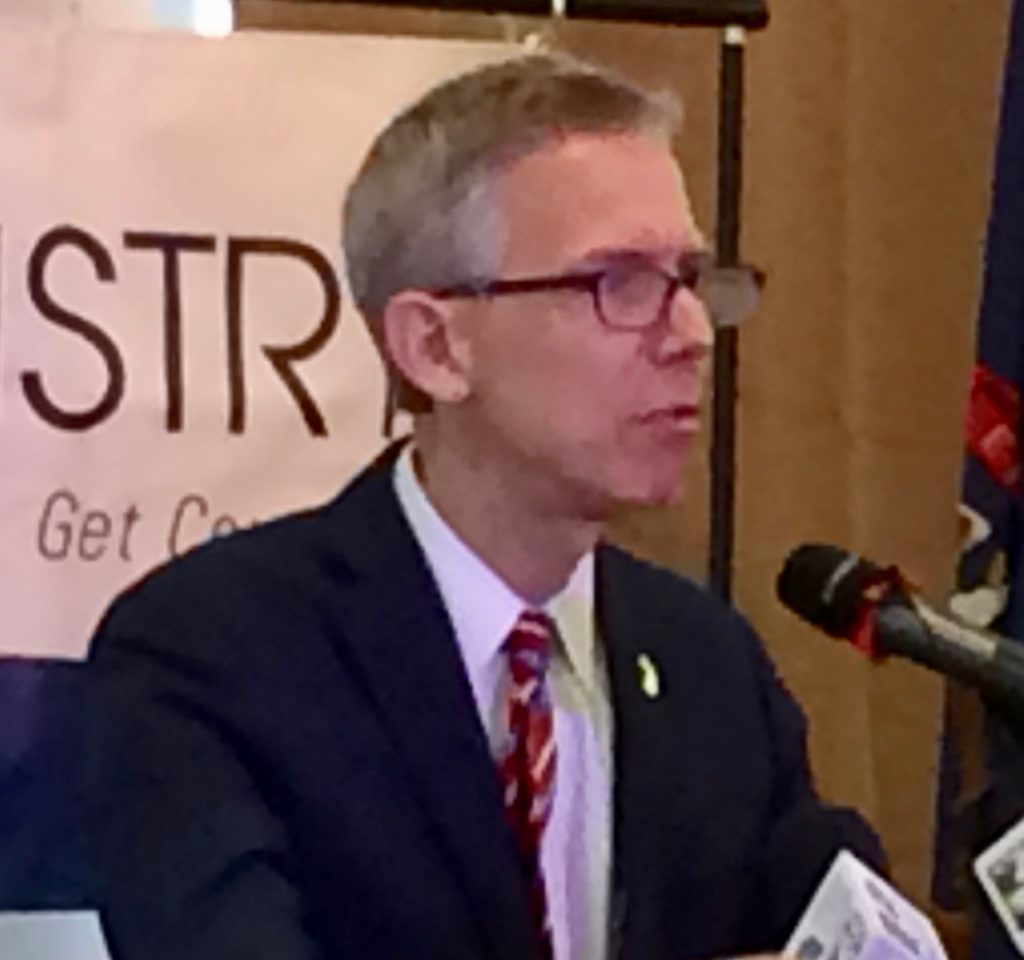
Robert Gordon, new director of the Michigan Department of Health and Human Services (Photo by Jan Worth-Nelson)
After Congressman Kildee noted to the audience that one of the biggest casualties of the water crisis was the public’s lack of trust in its public servants, an acknowledgement came from Robert Gordon, newly appointed director of the Michigan Department of Health and Human Services. Gordon said he was on his fifth day on the job after being hired by incoming Governor Gretchen Whitmer.
Acknowledging the loss of trust, in particular from his own department, Gordon said, “How do we rebuild that trust? One, we do the work. I have been so impressed with people you know and you don’t know who are there working–12-hour days. We need to keep doing that work.”
Second, he said, “We need to hold firm to the right principles.” He said he told his staff those principles include, “That you honor and listen to science and scientists, you put the interests of the public ahead of agency and personal interests, and you treat people whatever their race or background or where they’re from, with dignity, respect and with honesty. Those are hard principles to live up to and I won’t promise everything overnight, but those are the principles Gov. Whitmer believes in and I believe in and I hope you will hold me accountable.”
Kenyatta Dotson, chair of the Flint Registry community advisory board, said the Registry process has been community-informed and community-driven moving forward. She said Registry staff are “really listening” and taking many steps to educate and inform the community of the benefits of registering. “We have all been impacted…therefore we need to register ourselves, our family and others that we are closely connected to. It’s time for recovery, it’s time for healing from the devastation of the Flint Water Crisis.”
Hanna-Attisha detailed what she called “A model program for recovery,” in the months during and since the crisis, including “expanded home visiting, two child care centers, Medicaid expansion, breast-feeding support services, nutrition support, mindfulness in our schools–the list goes on and on to mitigate the impact of this crisis.”
She also introduced the newest resource for children in Flint, the Neurodevelopmental Center for Excellence, a result of an ACLU lawsuit settlement. It offers, she said, the resources to thoroughly assess all the children of Flint–a partnership with Genesee Health Systems and Hurley Medical Center.
Hanna-Attisha concluded with a quote from Martin Luther King: “Of all the forms of inequality, injustice in health is the most shocking and inhumane” She further quoted him, “Injustice anywhere is injustice everywhere.”
“Flint has had its share of injustice– social, economic, racial,” she said, “…The work toward restorative justice is a long path, but please know that this Registry is one tiny way of restoring that justice and bridging those inequalities, especially in health.”
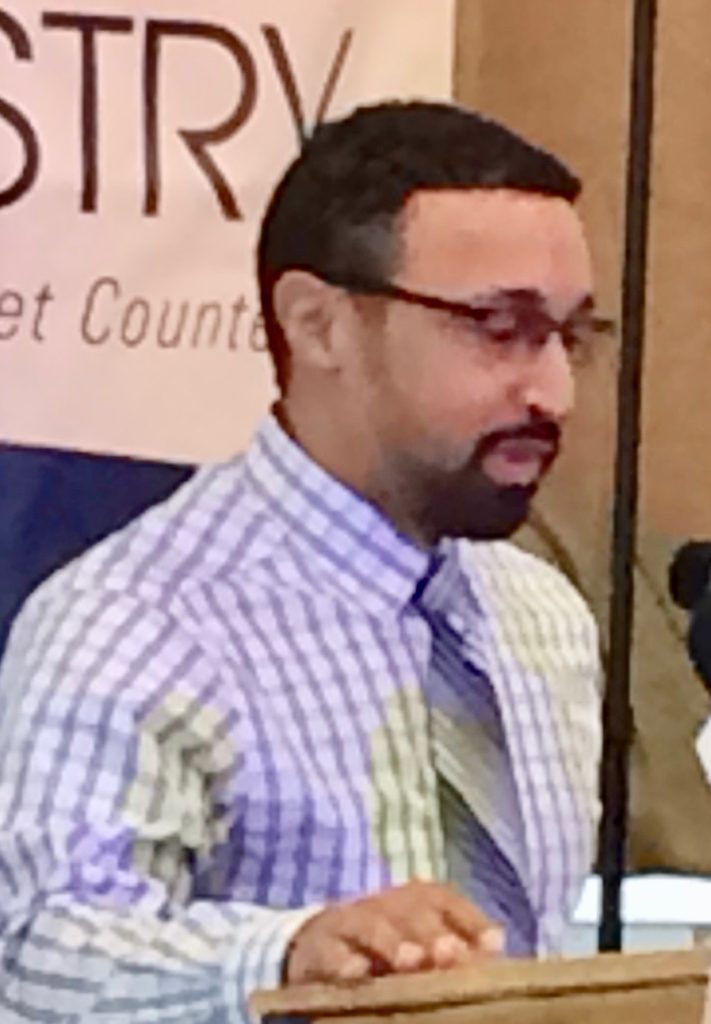
Pastor Rigel Dawson (Photo by Jan Worth-Nelson)
Pastor Rigel Dawson of North Central Church of Christ cited an anonymous quote, “The bitter fruit of crisis often carries the precious seed of growth.”
“I hate what was done to us, but I love what we’ve done with it,” Dawson said. “I love that so many have discovered their strength, found their voice, been able to tell their story in a powerful way; strong bonds have been formed, lasting partnerships. We stood up for ourselves, doggedly pursued outside resources we were owed, and began creating our own.
“The Flint Registry represents our determination not to be overlooked, or undercut, or ignored…the Flint Registry represents that we will not be paved over with platitudes or empty promises, but to come together as a community and be counted. Because we count. We matter,” Dawson said.
Musician and singer Roshanda Womack ended the event with an original song, “We Are Flint.”
The Flint Registry is headquartered in the old Flint Journal building, now owned by Michigan State University, at East First Street across from the Farmers’ Market.
EVM Editor Jan Worth-Nelson can be reached at janworth1118@gmail.com.
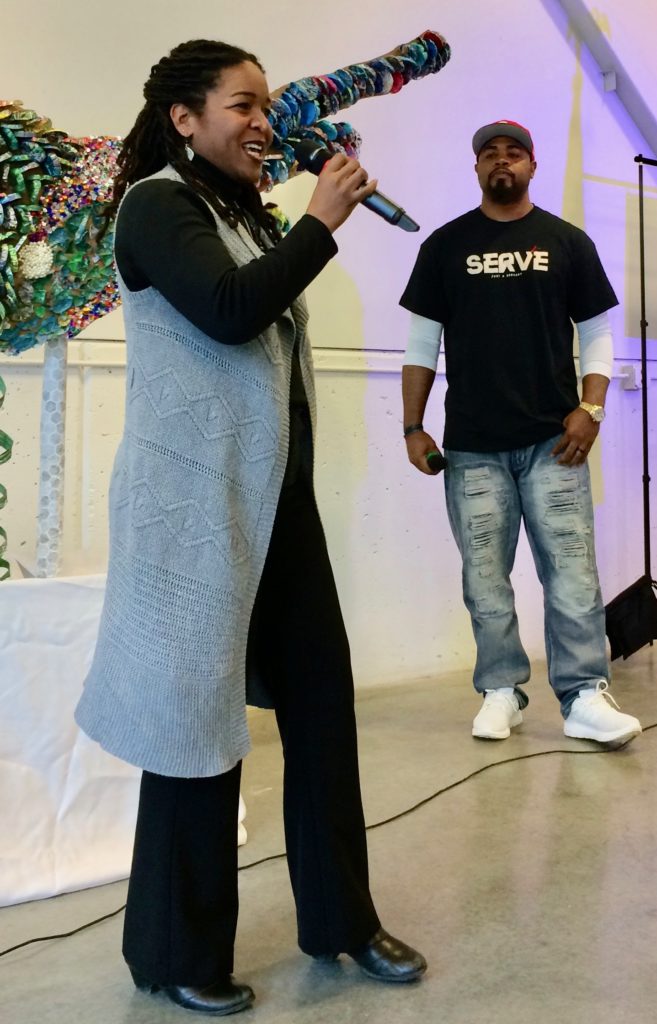
Roshanda Womack singing “We are Flint” with Joe Brown (Photo by Jan Worth-Nelson)


You must be logged in to post a comment.